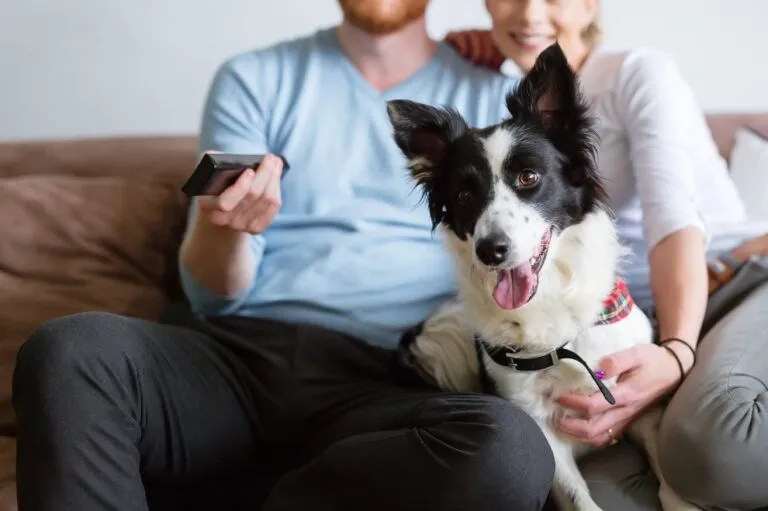The internet is awash with videos of dogs enthusiastically watching TV. But can dogs really watch TV and if so, how do they perceive the images on the screen?
Moving images and animal sounds on the television can capture your dog’s attention. However, not every dog recognises what’s being displayed on the screen.
Can Dogs Recognise Images on TV?
Whether it’s other dogs, humans or moving objects like footballs at a tournament, some dogs do seem to react to what they see on the TV screen. The responses range from joyous excitement to more aggressive reactions where some may bark at the screen.
Dogs Can Differentiate Between Animals and Humans
A study published in 2013 looked into whether dogs could recognize different images on a screen. Researchers showed dogs various pictures of faces from different dog breeds and mixes, alongside faces of other animal species and humans on a computer screen.
The results suggested that the nine dogs involved in the study could indeed distinguish between the various faces. All dogs were able to categorize dog images together successfully.
Why Do Dogs React Differently to TV?
It’s natural for a dog’s reaction to TV programming to be influenced by individual factors. This includes breed and personality.
A more territorial dog, for instance, may have a tendency to react more aggressively than a dog that is more affectionate towards people.
Dogs and TV: How Do They Perceive It?
Not every programme will capture your dog’s interest. But what exactly motivates dogs to pay closer attention to the screen? How do they perceive what’s being shown?
Why Do Dogs Notice TV?
Often, it’s not the image itself that triggers a reaction in your dog, but a sound. This can include noises made by fellow canines or other animals. Sometimes it could even be the sound of a doorbell ringing or a loud motorcycle.
However, some dogs respond solely to the visual aspect, even in the absence of background noise. This is particularly the case when other animals or people are shown from your dog’s perspective.
How Do Dogs Perceive TV?
Dog eyes have a higher flicker fusion rate (70/80Hz) compared to humans (50/60Hz). This rate indicates the frequency at which a changing light stimulus appears constant to the observer, meaning dogs can process images faster.
On older televisions (50/60Hz), which showed fewer frames per second, scenes would likely have appeared to flicker to dogs. However, developments in LCD (Liquid Crystal Display) technology have changed this. Modern devices typically operate at over 100Hz, making the picture appear much steadier.
Because of this, the dog-specific channel DogTV is said to use more frames per second. In addition, the programming is not just tailored in terms of brightness and satiety for dogs, but also includes music and contrasts.
Why Do Dogs Enjoy Watching TV?
Many dogs are not engaged enough throughout the day. This can particularly occur when their owners have to work long hours and can spend little time with them. A switched-on TV can then pique their interest, as the changing images on the screen are enticing to watch.
However, it’s important to remember that TV should not be seen as a long-term engagement for your dog, as its interest will likely wane sooner or later. Therefore, you should never consider the TV as a means to keep your pooch occupied.
Here are some purchase proposals curated by the zooplus editorial team
The products featured have been carefully selected by our editorial staff and are available at the zooplus online pet shop. The selection does not constitute advertising for the mentioned brands.
